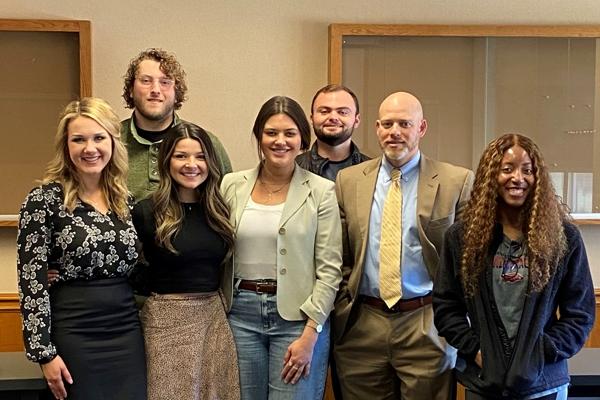
Catholic Charities of Arkansas has partnered with the University of Arkansas School of Law’s Immigration Clinic to provide legal representation to four Afghan refugees seeking assistance.
Since the last U.S. military plane departed Afghanistan Aug. 30, nearly 200 people have resettled in central and northwest Arkansas. Most came with only the clothes on their backs and have had to rely on charities for clothing, food, housing, furnishings and employment.
The State Department gave the refugees Special Immigrant Visas to let them enter, but many refugees have sought asylum and permanent residency for themselves and family members they had to leave behind.
It is a process that is slow and costly, as legal representation is often needed to advance through the process. This is where the law students were asked for help.
“Often asylum seekers arrive in our country with nothing, so any help they can get is usually essential,” said Jennifer Verkamp-Ruthven, director of Catholic Charities of Arkansas’ Immigration Services and Refugee Resettlement Office. “However, the main help they need is high-quality legal assistance. The asylum process is very complicated. It can take months or more than a year or two. Attorney fees for asylum can be very high, but the law clinic provides services pro bono, which is what our clients need. The law clinic has a good reputation, so we were thrilled to partner with them.”
Catholic Charities could provide funds for interpretation or for attorneys to accompany clients at their asylum interviews, Verkamp-Ruthven said.
While law students are handling the case work, they are supervised and supported by a law school faculty member, said Nathan Bogart, visiting professor and director of the Immigration Clinic.
So far, the students have interviewed and screened clients for eligibility, prepared applications for asylum, organized evidence and filed applications with the New Orleans Sub-Office of the U.S. Citizenship and Immigration Services.
“I would describe them as kind of a combination of overwhelmed but also hopeful and dedicated to getting their situation here established,” Bogart said of the refugees. “They're trying to adjust to a new culture, a new lifestyle. Arkansas has not historically had a large Afghan community, so a lot of resources that may be available to other immigrant groups are not available yet or just kind of nascent.”
Because of the influx of refugees since August, government entities have been overwhelmed, slowing their ability to process their cases. Having legal representation to make sure all applications and paperwork are in proper order will help speed the process, Bogart said.
“My understanding is the government is supposed to be expediting these cases in general, but the processing times are all over the place,” Bogart said. “We’re helping make sure that information we get from our clients is accurate, organized and easy to understand so that the messaging is clear to the government and they can understand why it is our clients are afraid of having to return back to Afghanistan.”
The ability to help people in need find solutions has been rewarding for the students in the clinic.
Sydney Adams, advanced immigration clinic student, said, “Everything I have done during my time in the clinic, from class discussions in the seminar to meeting with clients, has helped me grow both personally and professionally. It is not very often that you get an opportunity to learn in such a hands-on manner, and I feel extremely fortunate to have been afforded such.”
Being able to work on cases while in law school has been invaluable for his students, Bogart said.
“The experience for the students of both working with asylum-seekers and seeing the real-life consequences of current events could not be more valuable,” he said. “The practice of law is often helping people navigate needlessly complicated processes for even the most basic necessities. For the clients to be able to receive this help free of charge can be life altering.”
Please read our Comments Policy before posting.
Article comments powered by Disqus One Church drive for small Decatur church at halfway
One Church drive for small Decatur church at halfway
 Resettlement program seeking housing for new refugees
Resettlement program seeking housing for new refugees
 Interpreters, medical volunteers needed for clinic
Interpreters, medical volunteers needed for clinic
 Caseworkers continue state's long-term tornado recovery
Caseworkers continue state's long-term tornado recovery
 Catholic Relief Services: Rice Bowl Lenten sacrifice
Catholic Relief Services: Rice Bowl Lenten sacrifice
 'Cabrini' film tells story of saint with great faith
'Cabrini' film tells story of saint with great faith
 Bishop Taylor announces more pastoral appointments
Bishop Taylor announces more pastoral appointments
 Most U.S. Catholics approve of Pope Francis, Pew says
Most U.S. Catholics approve of Pope Francis, Pew says
 Winning directory photo honors Our Lady of Guadalupe
Winning directory photo honors Our Lady of Guadalupe
 St. Joseph a model of solidarity with immigrants
St. Joseph a model of solidarity with immigrants
 Two gifts after Jesus’ death: Virgin Mary and Eucharist
Two gifts after Jesus’ death: Virgin Mary and Eucharist
 Why we have an altar, and not just a communion table
Why we have an altar, and not just a communion table
 Pope: Wars should be resolved through nonviolence
Pope: Wars should be resolved through nonviolence
 Living relationship with Jesus Christ in the Eucharist
Living relationship with Jesus Christ in the Eucharist